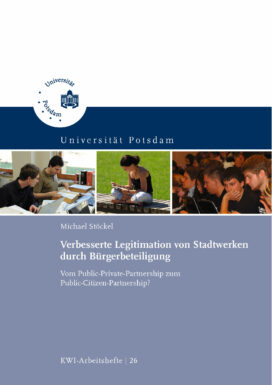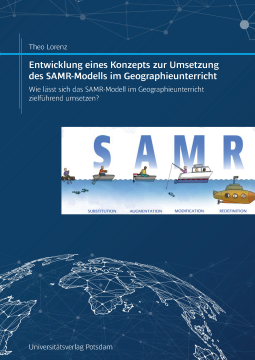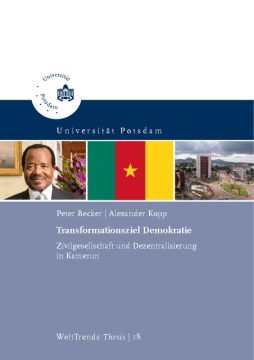Formal privatisation of Stadtwerke (municipal-multi-utility-companies) and the EU energy market liberalisation made Stadtwerke become independent from their original public-welfare mandate. Cities, as material owners of Stadtwerke, are no longer willing or able to steer the companies towards a political direction. Public companies in the electricity sector are now mostly organised in private company law, which makes the management autonomous towards political intervention. Therefore, the sole public purpose of Stadtwerke is to generate profit for the cities. The surplus generated in one sector (e.g. electricity) is then spent within the Stadtwerke holding on sectors which are less profitable, like public transport. In this situation researchers assume problems of legitimacy of municipal companies, since they are lacking substantial public purpose. It is argued by this paper that this legitimacy gap can be lessened, though not entirely eliminated, with methods of citizen participation by Stadtwerke. Here the German expression for citizen participation (Beteiligung) can mean both democratic participation, in the sense of cooperation and co-deciding, as well as financial participation. Two cases are qualitatively analysed: first, Stadtwerke Wolfhagen GmbH, in which a quarter of shares was sold to a ‘citizen energy co-operative’. Here the financial implication of citizen participation might be overstressed. However, the energy co-operative currently engages in energy efficiency programmes, which help the members of the cooperative to save electricity. In the case of Wolfhagen participation also generated acceptance for an onshore wind farm close to the city. The second case, Stadtwerke Potsdam GmbH, was troubled with a ‘public relation crisis’ and from there they tried more conventional models of citizen participation in order to regain acceptance. They recently founded a customer advisory board and established a renewable energy fund for their clients.
Von Public-Private-Partnership zu Public-Citizen-Partnership?
ISBN: 978-3-86956-474-6
141 pages
Release year 2019
Series: KWI-Arbeitshefte , 26
8,50 €
Non-taxable transaction according to § 1 (1) UStG/VAT Act in combination with § 2 (3) UStG/VAT Act a. F. Providing this service, the University of Potsdam does not constitute a Betrieb gewerblicher Art/Commercial Institution according to § 1 (1) No. 6 or § 4 KStG/Corporate Tax Act. If the legal characterization of our business is changed to a commercial institution subsequently, we reserve the right to invoice VAT additionally. zzgl. Versandkosten
Formal privatisation of Stadtwerke (municipal-multi-utility-companies) and the EU energy market liberalisation made Stadtwerke become independent from their original public-welfare mandate. Cities, as material owners of Stadtwerke, are no longer willing or able to steer the companies towards a political direction. Public companies in the electricity sector are now mostly organised in private company law, which makes the management autonomous towards political intervention. Therefore, the sole public purpose of Stadtwerke is to generate profit for the cities. The surplus generated in one sector (e.g. electricity) is then spent within the Stadtwerke holding on sectors which are less profitable, like public transport. In this situation researchers assume problems of legitimacy of municipal companies, since they are lacking substantial public purpose. It is argued by this paper that this legitimacy gap can be lessened, though not entirely eliminated, with methods of citizen participation by Stadtwerke. Here the German expression for citizen participation (Beteiligung) can mean both democratic participation, in the sense of cooperation and co-deciding, as well as financial participation. Two cases are qualitatively analysed: first, Stadtwerke Wolfhagen GmbH, in which a quarter of shares was sold to a ‘citizen energy co-operative’. Here the financial implication of citizen participation might be overstressed. However, the energy co-operative currently engages in energy efficiency programmes, which help the members of the cooperative to save electricity. In the case of Wolfhagen participation also generated acceptance for an onshore wind farm close to the city. The second case, Stadtwerke Potsdam GmbH, was troubled with a ‘public relation crisis’ and from there they tried more conventional models of citizen participation in order to regain acceptance. They recently founded a customer advisory board and established a renewable energy fund for their clients.
Recommended Books
-
 2013
2013Dharavi – ein Ort der Armut?
10,00 €Non-taxable transaction according to § 1 (1) UStG/VAT Act in combination with § 2 (3) UStG/VAT Act a. F. Providing this service, the University of Potsdam does not constitute a Betrieb gewerblicher Art/Commercial Institution according to § 1 (1) No. 6 or § 4 KStG/Corporate Tax Act. If the legal characterization of our business is changed to a commercial institution subsequently, we reserve the right to invoice VAT additionally.
zzgl. Versandkosten
Add to cart -
 2022
2022Entwicklung eines Konzepts zur Umsetzung des SAMR-Modells im Geographieunterricht
10,50 €Non-taxable transaction according to § 1 (1) UStG/VAT Act in combination with § 2 (3) UStG/VAT Act a. F. Providing this service, the University of Potsdam does not constitute a Betrieb gewerblicher Art/Commercial Institution according to § 1 (1) No. 6 or § 4 KStG/Corporate Tax Act. If the legal characterization of our business is changed to a commercial institution subsequently, we reserve the right to invoice VAT additionally.
zzgl. Versandkosten
Add to cart -
 2014
2014Transformationsziel Demokratie
7,00 €Non-taxable transaction according to § 1 (1) UStG/VAT Act in combination with § 2 (3) UStG/VAT Act a. F. Providing this service, the University of Potsdam does not constitute a Betrieb gewerblicher Art/Commercial Institution according to § 1 (1) No. 6 or § 4 KStG/Corporate Tax Act. If the legal characterization of our business is changed to a commercial institution subsequently, we reserve the right to invoice VAT additionally.
zzgl. Versandkosten
Add to cart -
 2009
2009The UN Peacebuilding Commission
6,00 €Non-taxable transaction according to § 1 (1) UStG/VAT Act in combination with § 2 (3) UStG/VAT Act a. F. Providing this service, the University of Potsdam does not constitute a Betrieb gewerblicher Art/Commercial Institution according to § 1 (1) No. 6 or § 4 KStG/Corporate Tax Act. If the legal characterization of our business is changed to a commercial institution subsequently, we reserve the right to invoice VAT additionally.
zzgl. Versandkosten
Add to cart
Publisher Info
Contact
Potsdam University Library
University Press
Am Neuen Palais 10
14476 Potsdam
Germany
verlag@uni-potsdam.de
0331 977-2094
0331 977-2292





